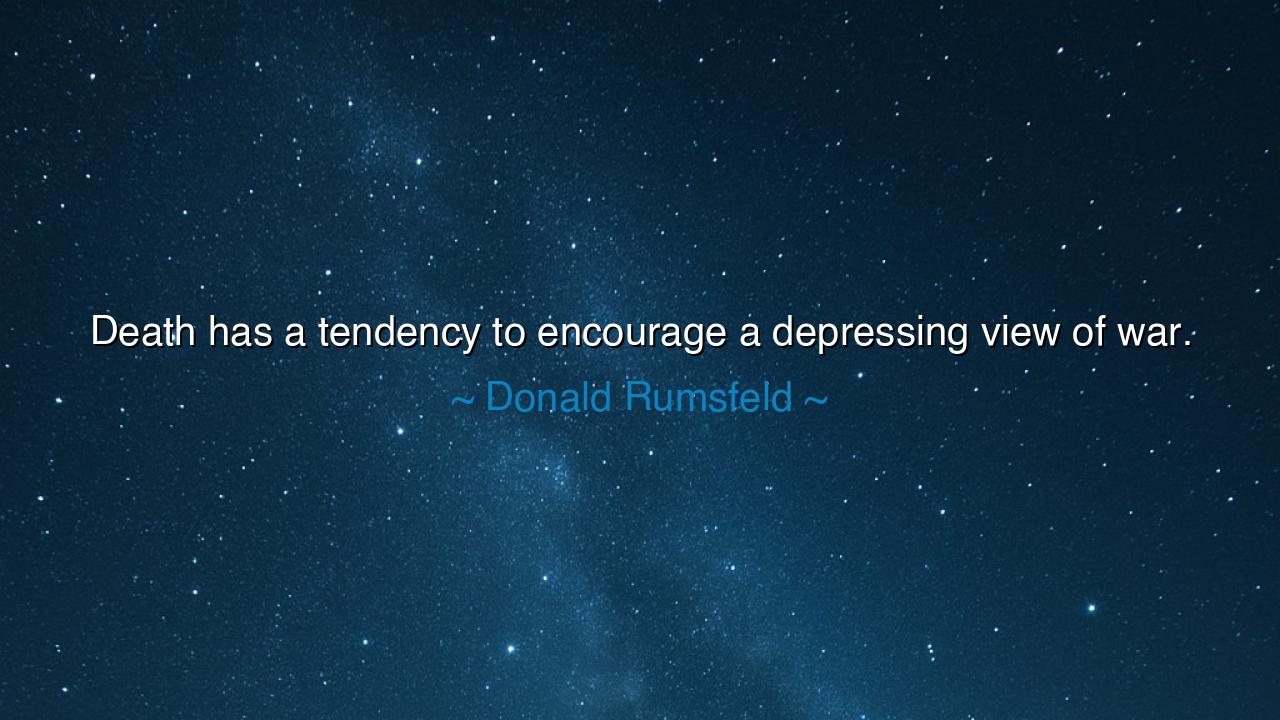
Death has a tendency to encourage a depressing view of war.






In the austere and unsettling words of Donald Rumsfeld, a man who stood at the helm of war in a modern empire, we find a truth both biting and tragic: “Death has a tendency to encourage a depressing view of war.” Though his tone may seem detached, even ironic, beneath it lies an eternal contradiction—the tension between glory and grief, between the illusion of noble conquest and the grim certainty of human loss. In this single line, wrapped in the language of understatement, Rumsfeld speaks to the ancient tragedy of warfare: that every victory is written in blood, and every banner of triumph casts a shadow shaped like a grave.
To say that death “encourages a depressing view” is to confront the hypocrisy of war’s grandeur. Nations, leaders, and poets have long cloaked battle in the robes of honor and destiny. They speak of valor, of duty, of sacrifice—yet in the quiet aftermath, when the smoke clears and the bodies lie unnumbered, the truth emerges like a ghost from the mist. War is not the shining march of heroes but the slow and sorrowful unraveling of life. Rumsfeld, a man once charged with orchestrating conflict, knew that the language of strategy and victory falters before the image of the dead. For when death speaks, all justifications fall silent.
This truth was known even to the ancients. When Achilles, the mightiest of warriors, finally slew Hector, his great rival, he did not feel triumph, but emptiness. Standing over his fallen foe, he beheld not glory, but the reflection of his own mortality. The poet Homer, in his divine wisdom, showed that war’s true cost is not paid in victory, but in human sorrow. Achilles had won the battle, but lost his soul. Thus, even in the age of bronze and gods, the wise understood what Rumsfeld’s modern irony conceals: that death strips war of its illusion.
History, too, bears this lesson in every generation. During the Great War of the twentieth century, men marched to the front believing themselves to be part of some grand design. They sang of honor as they went “over the top,” only to drown in mud, poison gas, and futility. The poets who survived—men like Wilfred Owen and Siegfried Sassoon—returned not as heroes, but as witnesses. Their words became dirges, not hymns. Owen, who died days before the armistice, wrote, “My subject is war, and the pity of war.” It is that same pity that Rumsfeld’s dry humor conceals: the grim recognition that death reveals the futility of the very thing it serves.
Yet, within the cynicism of the quote lies another layer of meaning—a defense mechanism born from the unbearable weight of responsibility. Those who command wars must often cloak their grief in irony, for to feel it too deeply is to break under its weight. The generals and ministers of the world, though they wield words like weapons, are haunted by the same truth as the foot soldier: that war is always a failure of peace, and death is its only consistent victory. Thus, Rumsfeld’s statement is both confession and evasion—a man’s attempt to reconcile the abstract world of power with the visceral reality of human suffering.
But for those who hear his words not as jest but as warning, there is wisdom to be drawn. Let us remember that every time we speak lightly of war—every time we reduce it to numbers, tactics, or necessity—we risk forgetting the sacredness of life itself. Death does not simply “encourage a depressing view”; it demands one. To be depressed by death is not weakness—it is humanity. It is the refusal to grow numb to the pain of others. The ancients called this piety—the reverence for life, even in the face of its inevitable loss.
So, children of tomorrow, let this lesson echo in your hearts: never speak of war without remembering the dead. Let no flag, no ideology, no promise of order blind you to the truth that every fallen life diminishes the world. And if ever you must lead, lead not with pride in victory, but with sorrow for its price. For the wise know, as Rumsfeld’s grim words imply, that the truest understanding of war is not found in the clash of armies or the rise of empires, but in the silence that follows—the silence in which the names of the lost are whispered, and the living must ask themselves whether the price of power was worth the cost of the soul.






AAdministratorAdministrator
Welcome, honored guests. Please leave a comment, we will respond soon